June 6, 2025 | 08:07 GMT +7
June 6, 2025 | 08:07 GMT +7
Hotline: 0913.378.918
June 6, 2025 | 08:07 GMT +7
Hotline: 0913.378.918
Bo Khai is a wild plant often found around rocky areas in the northern provinces of Vietnam including Cao Bang, Bac Kan, and Lang Son. This plant is a creeper vine, and local people often pick the tops and young leaves to boil, stir-fry or stew. Bo Khai is often considered a premium specialty in some northern provinces of Vietnam.
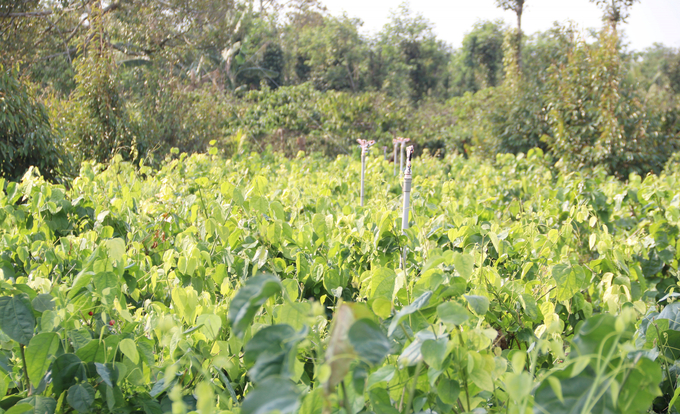
Cao Bang Agricultural Service Cooperative grows more than 40 hectares of organic, VietGAP-compliant Bo Khai. Photo: Quang Yen.
The majority of Tay ethnic people who left Cao Bang in the 1980s now reside in Cao Bang village, Ea Knuc commune, and Krong Pac district in Dak Lak province. Coffee was once a main source of income at the time during their migration to the Central Highlands.
By 2015, most perennial coffee tree grow old and had low yield, so many farmers wanted to convert to other crops. After learning that Bo Khai can bring a stable income, Mr. Hoang Van Hieu, Director of Cao Bang Agricultural Service Cooperative in Cao Bang village has brought the renowned plant from Cao Bang province to develop a commodity production business in Ea Knuc commune.
During the pilot planting period, the adaptability of Bo Khai to the land was low, and Mr. Hieu was inexperienced. As a result, only half of the initial 2,000 Bo Khai seedlings (which is worth VND 120 million) survived.
Mr. Hieu's farm began its harvest season after one year of making basic adjustments. However, the output was mainly green Bo Khai, and its nutritional value was not as high as the red Bo Khai. Subsequently, Mr. Hieu propagated red Bo Khai from available plants to replace the green Bo Khai. Mr. Hieu's family now has a steady source of income from nearly 1.3 ha of Bo Khai intercropped with durian trees.
Seeing the financial potential of Bo Khai, six Bo Khai farmers in Cao Bang village collaborated to establish a production cooperative group in 2017. The group admitted 7 additional members by 2020, bringing the total number of members to 13, then established Cao Bang Agricultural Service Cooperative. So far, the cooperative has 21 official members and 20 associate members with a total production area of over 40 ha.
According to Mr. Hieu, output of Bo Khai production varies depending on the season. Namely, output will drop during the cold season, but the price will increase in return. The cooperative harvests approximately 2 tons of Bo Khai every month with an average price of VND 60,000/kg.
“The cooperative's Bo Khai products are consumed nationwide. The cooperative has entered a partnership with the USA to officially export Bo Khai to this market. The weekly output is at least 200 kg depending on the order," said Mr. Hieu.
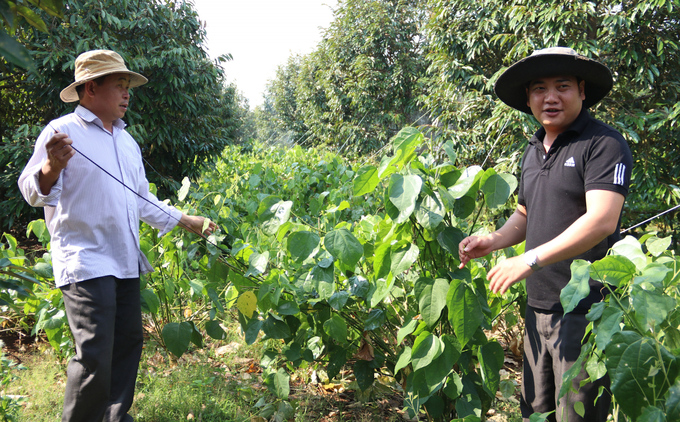
The cooperative's model of Bo Khai intercropped with durian. Photo: Quang Yen.
According to Mr. Hieu, official cooperative members all follow the model of durian intercropped with Bo Khai. Consequently, the output is noticeably lower compared to the association model.
Official members who have a production area of over 1 ha earn at least VND 15 million in monthly profit. For associate members, their monthly income can reach VND 70 - 80 million.
“In 2020, Cao Bang Agricultural Service Cooperative received a VietGAP certificate for its Bo Khai products. The cooperative requires its members to adhere to the goal of organic and VietGAP production, such as utilizing biological pesticeds and fertilizers to improve product quality and establishing uniformity in quality and design. The cooperative also follows a traceability process to ensure quality for export," added Mr. Hieu.
Regarding future plans, Mr. Hieu said that the cooperative aims to expand its land area. However, the cooperative members are facing difficulties because large durians occupy the majority of the land. "The cooperative wants to replicate the model, but we are currently limited in terms of land fund, investment capital and unstable output".
Members of Cao Bang Agricultural Service Cooperative used to grow coffee and pepper as their main crops. They looked for new plants when the coffee and pepper trees died one after another. The first farmers to test Bo Khai plant found unexpected success, so they replicated the model for the neighboring households.
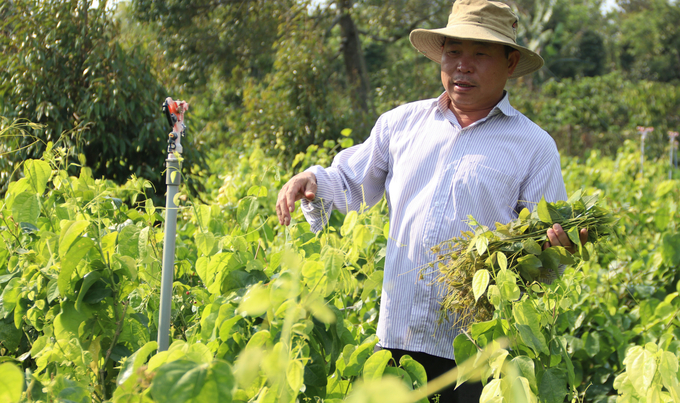
Mr. Trieu Van Hanh's family earns around 15 million VND every month from growing Bo Khai plants. Photo: Quang Yen.
Mr. Trieu Van Hanh's family in Cao Bang village has over 1 ha of durian intercropped with Bo Khai. Mr. Hanh is one of the first cooperative members to experiment with growing Bo Khai plants. He initially had to import seeds from Cao Bang.
“The family has to spend around VND 100 million on seedlings for 1 ha of land. We also invested in a water-saving irrigation system that cost VND 25 million. We started the trial planting when the Covid-19 pandemic struck, so the output and income were very low. The output has become more stable since the pandemic was under control, so the farm started generating profits. We earn around VND 15 million every month from selling this plant," Mr. Hanh shared.
In a similar manner, Mr. Nong Van Long's family moved to Cao Bang village, Ea Knuc commune in 1985 and has more than 6 sao (Vietnamese measurement, equals to approximately 3000 m2) once planted coffee trees. After learning about the effectiveness of the Bo Khai production model, Mr. Long abandoned coffee and switched to Bo Khai.
“Growing and caring for this plant is relatively simple, but the initial investment costs are truly high. We grow a small amount of Bo Khai so the income is only VND 10 million per month. Once the plant grows steadily, it only needs proper shading and applying organic fertilizer 4 times a year to give a regular yield every 3 to 4 days," Mr. Long said.
Mr. Ha Van Du, a member of Cao Bang Agricultural Service Cooperative, said that Bo Khai brought high income for the family. Similar to the aforementioned stories, Mr, Du started out as a coffee and pepper farmer when he first migrated to Cao Bang village. However, the family converted to the Bo Khai production model after their coffee trees grew old.
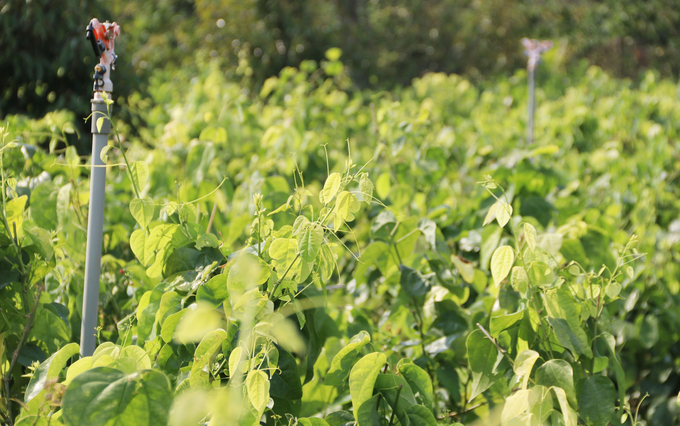
Bo Khai is a new crop in the Central Highlands but it brings stable income to the farmers. Photo: Quang Yen.
“After being mobilized, the family decided to abandon the coffee - pepper intercropped farm in favor of the Bo Khai variety from Cao Bang. After a challenging period during the Covid-19 pandemic, the output has now been stabilized.
"My family has an monthly income of nearly VND 20 million thanks to the the intercropped model of Bo Khai. A family with three with this income can live comfortably. On the other hand, we expect durians to bring us significant income in the near future," Mr. Du added.
According to the Head of the People's Committee of Ea Knuc commune, Cao Bang Agricultural Service Cooperative has raised the hopes of many local farmers. Bo Khai is not only a valuable crop in terms of economic benefits but it is also a new modern and VietGAP-compliant crop. All products from the Bo Khai plant are utilized for their added values. Namely, clean vegetables are sold directly to restaurants and hotels without intermediaries, so farmers can earn a considerable profit.
Translated by Nguyen Hai Long
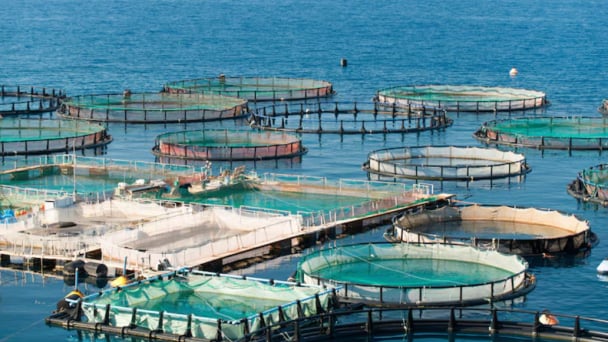
(VAN) Technology is redrawing the map of Vietnamese aquaculture: more modern, greener, and more sustainable.

(VAN) Novel process harnesses machine learning to reveal groups of genes that determine how efficiently plants use nitrogen.

(VAN) Several scientists and farmers are experimenting with soil treatment in some key durian-growing regions such as Cai Lay (Tien Giang), Dak Song, Gia Nghia, and Dak R’lap (Dak Nong).
/2025/05/25/4127-3-073637_820.jpg)
(VAN) Thanks to the promotion from an FAO-implemented project, vegetable production in greenhouses in Moc Chau has seen strong development, from 1.5 hectares in 2021 to nearly 50 hectares in 2024.

(VAN) FAO has recently supported USD 140,000 to implement the project 'Risk mitigation human-animal interface risks through disease control initiatives in pig farming.'

(VAN) The People's Committee of Tra Vinh province has approved an adjustment to the investment policy for the Green Hydrogen Plant project, increasing its area to approximately 52.76 hectares.
![Reducing emissions from rice fields: [2] Farmers’ commitment to the soil](https://t.ex-cdn.com/nongnghiepmoitruong.vn/608w/files/news/2025/05/05/dsc08881jpg-nongnghiep-140632.jpg)
(VAN) Clean rice cultivation model in Thuong Tan commune, Bac Tan Uyen district, is assisting local residents in achieving sustainable agriculture by substantially reducing costs, increasing productivity, and protecting the environment.